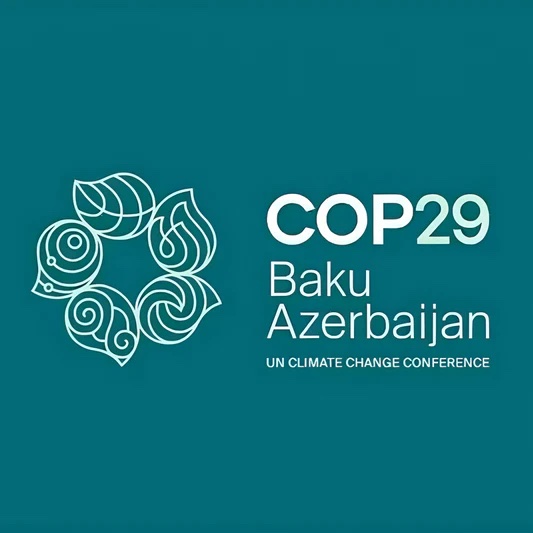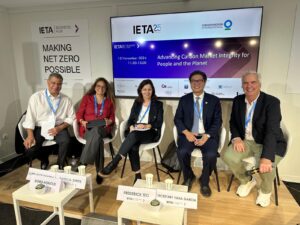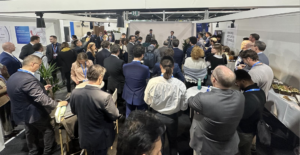COP29 update: Day 5, 15 November

Greetings from Baku!
Somewhere along the line this year the Article 6.4 mechanism acquired a “proper” name, and we thought we should start using it. So please give a warm welcome to the Paris Agreement Crediting Mechanism, which will no doubt be abbreviated as PACM. And we’re absolutely not going to refer to it as Pac-man.
The pace of negotiations seemed to slow down on Friday. Perhaps the technical discussions on many agenda items have reached a point where more political conversations became necessary, which will start next week. Nonetheless, there were some developments to digest.
A new and slimmed-down draft negotiating text on the New Collective Quantified Goal appeared early on Friday evening, featuring far fewer options and many fewer brackets.
The wide variety in proposed financial sums remains, but these are acknowledged to be political matters that can only be resolved next week.
It’s worth highlighting that paragraph 93 of the 25-page document “encourages Parties and other relevant actors to explore the use of, and scale up..innovative sources of finance…including high-integrity voluntary carbon markets.”
Outside the negotiating rooms, the U.K. published its principles for voluntary carbon and nature market integrity, which add to the body of work supporting greater integrity in the VCM. The U.K. document was welcomed by the VCMI and other stakeholders.
And an interesting little snippet about future COPs appeared on the Guardian’s daily blog today: Australian climate change minister Chris Bowen reportedly visited Turkey today in an effort to persuade Ankara to withdraw its candidature to host the UNFCCC summit in 2026, and allow the Aussies to bring us all Down Under for COP31.

We were delighted to welcome COP26 president Lord Alok Sharma, as well as Secretary Yana Garcia of California to our side event on carbon market integrity.
The chair of SBSTA published a slimmed-down draft Article 6.2 text just after midday on Friday. The document runs to 19 pages rather than the previous 43, and contains no bracketed items or options.
Observers expressed satisfaction with the update. as well as optimism that a positive outcome was now on the cards.
At a Heads of Delegation meeting to discuss the latest draft, several Parties expressed deep concern and discomfort, but most seemed to be willing to engage with the text. Another Article 6.2 meeting with technical negotiators is scheduled for this evening from 2000 AZT to resolve outstanding technical matters, in order to present a new text tomorrow.
However, negotiators decided to keep talking after the Heads of Delegation meeting was finished, and as of 2100 AZT were still locked in discussions.
Our observers say the draft is mixed. On the negative side, there is a definition of cooperative approach that would ban unilateral authorisations for NDC use, which might possibly make CORSIA unworkable.
Draft language on the international registry is trying to bridge differences between Parties, but the U.S. and the AILAC group are both unhappy for opposing reasons.
On sequencing, there is now no obligation for Parties to wait for the review of their initial report to authorise and trade ITMOs. This is a positive move.
And a new section with additional guidance on the initial report is seen as positive: more information is not a bad thing, our team says.
The strong focus on 6.2 today meant that there was no time to convene a contact group on Article 6.4, and we anticipate this work stream will resume tomorrow.
Discussions also took place on Article 6.8 (non-market mechanisms), with a draft negotiating text.
The SBSTA contact group dealing with guidance to the Clean Development Mechanism met on Friday morning to discuss proposals for winding down the mechanism after completing the transfer of projects, methodologies and credits to the Paris Agreement Crediting Mechanism (PACM).
The bulk of the draft text under consideration concerns deadlines for CDM projects and methodologies to complete their transfer into the PACM, and the end-dates for various CDM functions. The headlines are (and please remember this is not a decision):
- Requests for issuance of CERs to end on 31 December 2025;
- Requests for transfer of CERs into PACM to end on 31 December 2026;
- Cancellation of CERs and any other transactions in the CDM registry on 31 December 2026;
- Requests for post-registration changes to stop on 31 December 2025;
- Submission of proposed new methodologies, requests for revisions to methodologies and methodological tools submitted under the bottom-up process to end on 31 December 2024;
- Accreditation of CDM designated operational entities to end on 31 December 2026;
- Disconnect the CDM registry from the international transaction log, (but maintaining the functions of issuance and cancellation in the CDM registry) no later than 1 July 2025;
- Stop operating the CDM registry once 1-3 above have been completed;
- Submission of new CDM methodologies, approvals and revisions shall be limited to addressing any environmental integrity issues, and will cease when PACM Supervisory Body approves a methodology, methodological tool or standardised baseline covering the same scope, but in any case no later than 31 December 2025;
- Accreditation of DOEs to end on 31 December 2026, and no new requests for accreditation after 31 December 2024;

Arguably the biggest news of the day was the announcement that the ICVCM had awarded Core Carbon Principles (CCP) status to three REDD+ standards.
The ART REDD+ Environmental Excellence Standard (TREES) v2.0, Verra’s VCS VM0048, and its VCS Jurisdictional and Nested REDD+ (JNR) Framework v4.1, are expected to start issuing credits soon, making them eligible for the CCP label from early 2025.
The ICVCM was at pains to highlight that its decision does not indicate it believes that these three methodologies are of higher integrity than any other REDD+ methodologies; these were the only methodologies put up for consideration, and work on other REDD+ methodologies is underway.
From our perspective, IETA is pleased with the development, as it can only grow the flow of finance into nature-based solutions.
Saturday at the IETA Business Hub
Many of the events hosted at the IETA Business Hub will be webcast – just click on the links to participate! All event times are listed in Azerbaijan time (AZT), which is three hours ahead of Central European and four hours behind Singapore time.
IETA’s BusinessHub is located in Area E, Pavilion H6, in the Blue Zone. We’re close to the pavilions of Georgia, Moana Blue Pacific and Namibia.
We have a short programme of side events on Saturday at the Business Hub
Our first session starts at 1130 AZT (0830 CET). IETA, Emergent and The Nature Conservancy will co-host a discussion on how emissions trading systems, the VCM and Article 6 can finance nature and sustainable development. This event will not be webcast.
At 1330 AZT, the Environmental Markets Fairness Foundation (EMFF) and Edenor will host an event examining the role of environmental markets in Latin America, with particular reference to nature-based solutions. Watch the session here.
Finally, Peru’s ministry of climate change will chair a discussion of nesting frameworks and approaches in Latin America. The panel will present the experiences of Peru and Brazil, identifying the progress, challenges, and work carried out by the different actors associated with the implementation of REDD+ nesting processes. You can join the session here.